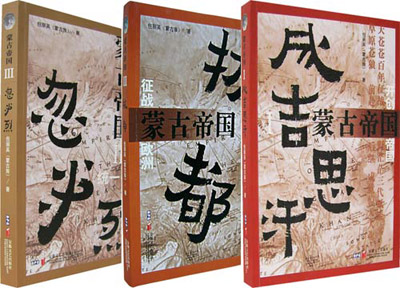
Genghis Khan, the man who founded the Mongol Empire and conquered half of Europe, died in 1227, leaving behind many mysteries. Around the 780th anniversary of his death, an attempt was made to unveil them via a newly published book trilogy, Mongol Empire. The series caused a sensation in China, partly because of the rarity of the content carried in the book and partly because of the rarity of the DNA carried by the author. She is the 36th generation of Genghis Khan.
Bao Liying, 39 years old, graduated from Peking University, scribbled away at her three part epic for over 20 years, namely, Genghis Khan, Batu and Kublai, according to the West China City Daily report.
As a direct descendant of Genghis Khan, Bao noted in her book a point that surprises many: among the big three, Genghis Khan was the least understood khan in history.
Rumors about him abound. Some say he conquered the world only to vanquish the hearts of women, some say he was a ruthless and blood thirsty despot. Bao denies all these allegations by providing many facts. She astutely cites the defensive fight against Jin Dynasty, which was commonly accepted as staged by Genghis Khan.
"The truth is, Jin launched a scorched earth campaign at the Mongols first," Bao stated, "Every three years the Jin troops intruded on Mongolian lands, killing men and capturing women. A brother of Genghis Khan's grandfather was tortured to death by them. It's only natural for him to have sought revenge later, avenging both his family and his nation."
"It's not that he made the war, it's more the fact that the war made him," Bao insists. "For he was so brilliant and brave while leading his army."
Bao also stresses the need to draw a line between a historical novel and a playful interpretation of history, which is also the purpose of her writing this book.
Mongol Empire significantly fills certain blanks in China's literature. Wang Qilong, a professor of Mongolian history from Tsinghua University points out, by this standard, Batu, among all three volumes, holds the highest value.
Batu, the grandson of Genghis Khan, founded the Khanate of Kipchak, colloquially known as the Golden Horde. His empire once expanded westward as to the Danube. Although stories of Genghis Khan and Kublai Khan's families are repeated in countless books today, the story of Batu himself remains largely untold, except via one Soviet writer.
The motivation behind such a book can be traced back to 1986, when Bao Liying entered Peking University majoring in chemistry. In the university library she inadvertently discovered many distorted facts in historical books covering the Yuan Dynasty so she set her mind on restoring the truth for her ancestors. And after some 20 years of effort, her dream has come true.
During her long writer's journey, Bao's leisure time was spent writing. She can't type so she wrote her book in longhand. Stooping for hours over a desk, she developed pains: in the neck, waist and shoulders. Finally her sufferings evolved into chronic diseases. Bao endured all these difficulties to meet her goal.
Considering herself as the guard of the Genghis Khan family legacy, she succinctly wrote in her book's preface, "I kept marching forward on my long journey as if they were watching me."
(China.org.cn, August 11, 2007) | 